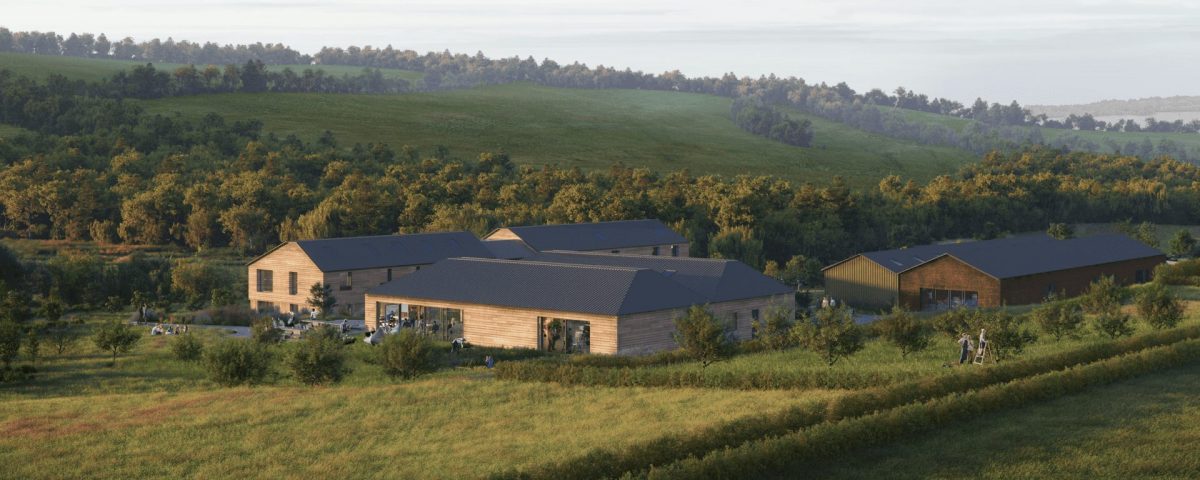- Privacy On Demand
- 020 8150 0080
- 0845 3886618
- info@priviglaze.com

30+ Midcentury Modern Bedroom Ideas
12 July 2023
Architonic Live Talks: what you may have missed at imm cologne 2023 | News | Architonic
15 July 2023Andrew Mcmullan on the power picnic – OnOffice

[ad_1]
As we rethink the workspace in our post-pandemic rush towards a biophilic future, then perhaps it’s time to reconsider the power lunch too
In 1979 the Power Lunch was born when Lee Eisenberg, the then editor-in-chief of Esquire magazine in the States, described an emerging lunch phenomenon witnessed at the Four Seasons in midtown Manhattan. More than 40 years later, I’d like to champion a new concept in workplace dining: the Power Picnic.
My belief that al fresco beats al desko comes from my work on The Hatchery at Preston Farm – a former dairy farm in Kent my studio is repurposing as a rural campus. As I wrote in What the rural workplace revolution means for the future of work, designing a rustic co-working space means rethinking more than just the physical space. It involves rethinking every aspect of modern work.
The classic office model – a box with desks disconnected from its surroundings – has no place in modern cities, let alone the countryside. Everything we’re doing at Preston Farm is designed to connect people with each other, the wider community and the beautiful surroundings. The Power Picnic is a natural, culinary extension of our design approach.
Read more: Together Has Changed is Cutwork’s manifesto for post-Covid working and living
While eating lunch at your desk is considered a sign of industriousness, evidence suggests the opposite is true. Last year, a survey of 2,000 employees and 1,000 managers commissioned by Lenovo, found that spending just 29 minutes outdoors results in a 45% increase in productivity. Since the pandemic, time with nature was a newfound priority for 56% of employees.
It’s not surprising. Numerous studies have shown that time outside increases happiness and energy, improves memory and creativity, and reduces stress. The challenge for architects is creating spaces that cater to our innate desire to connect with nature and other living things. In other words, adopting a biophilic approach to workplace design.
At Preston Farm, one example of our own biophilic response is a series of breakout spaces situated areas across the property – from the former farmyard to surrounding fields. Designed to be enjoyed all-year-round, they’re connected by a series of pathways protected from the British weather by strategically planted greenery and tree canopy. As the project evolves, we’d like to create more spots for Power Picnics on the banks of the River Darent where it flows through the farm. One day, workers may even catch their own lunch: fishing rights permitting.
Connecting people with the food they eat is another important element of our designs. We want our breakout spaces to be more than passive picnic spots. Instead, we want them to become ‘micro farms’ where people can grow what they eat and sell what they can’t in the spirit of rural entrepreneurialism that runs through the farm, past and present. One day, I’d love to see jars of Preston Farm kimchi or jam at my local deli.
Read more: The Future of the Office: Will the workplace ever be the same again?
Growing food will nourish community spirit, too. Realising the potential of our ‘micro farm’ concept, will require the expertise of local farmers, growers and home cooks. Inviting them to the farm to share their know-how, will strengthen bonds between the workspace and wider community.
Hopefully, it will also lead to an exciting collision of ideas as farmers, creatives, makers and entrepreneurs develop innovative and sustainable ways to boost the local economy and jobs market. For example, establishing a micro-brewery to turn local apples into cider.
It’s unlikely that workers at Preston Farm will have time to grow, make and bake everything on the Power Picnic menu. So local producers will enjoy a new market for their produce, reaching people who are keen to eat delicious food made from ingredients that are locally-sourced and sustainably farmed.
Catering to the tastes of these new rural workers will hopefully make sustainable food production more productive and profitable. It may even encourage greater biodiversity as workers seek the food variety they enjoyed working in metropolitan areas.
Read more: Leading Finnish green city Lahti sets up remote workstations in nature sites free for everyone to use
I was tempted to end this piece with menu suggestions – Scotch Eggs reimagined for the fourth industrial revolution. Instead, I’ll say a few words about the Eden Project. A few years back, it commissioned research from the University of Oxford into the benefits of communal eating. The study found that dining together increases social bonding and feelings of wellbeing. It also enhances a person’s sense of contentedness and belonging within a community.
Translated into workplace language, eating lunch together means happy workers and stronger teams. I believe the informal and egalitarian nature of Power Picnics will also help boost creativity, enterprise and innovation as people from different disciplines and levels of experience network together. When that happens, I like to think ideas will flow faster than Preston Farm Craft Cider…coming to a picnic blanket near you soon. I hope.
Image courtesy of Mcmullan Studio
As featured in OnOffice 156, Autumn 2021. Read a digital version of the issue for free here.
[ad_2]
Source link

